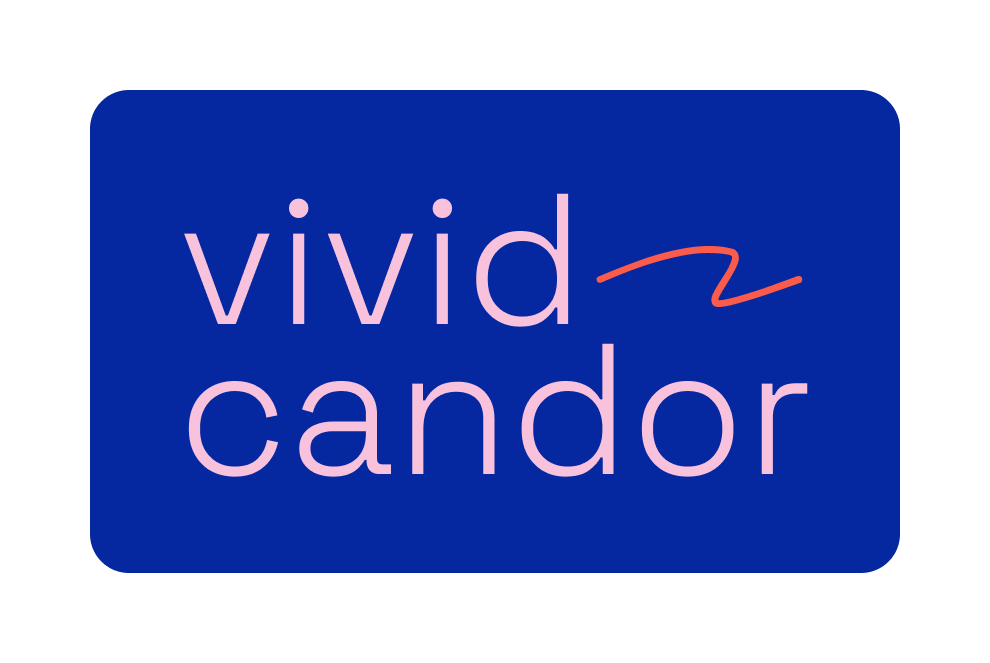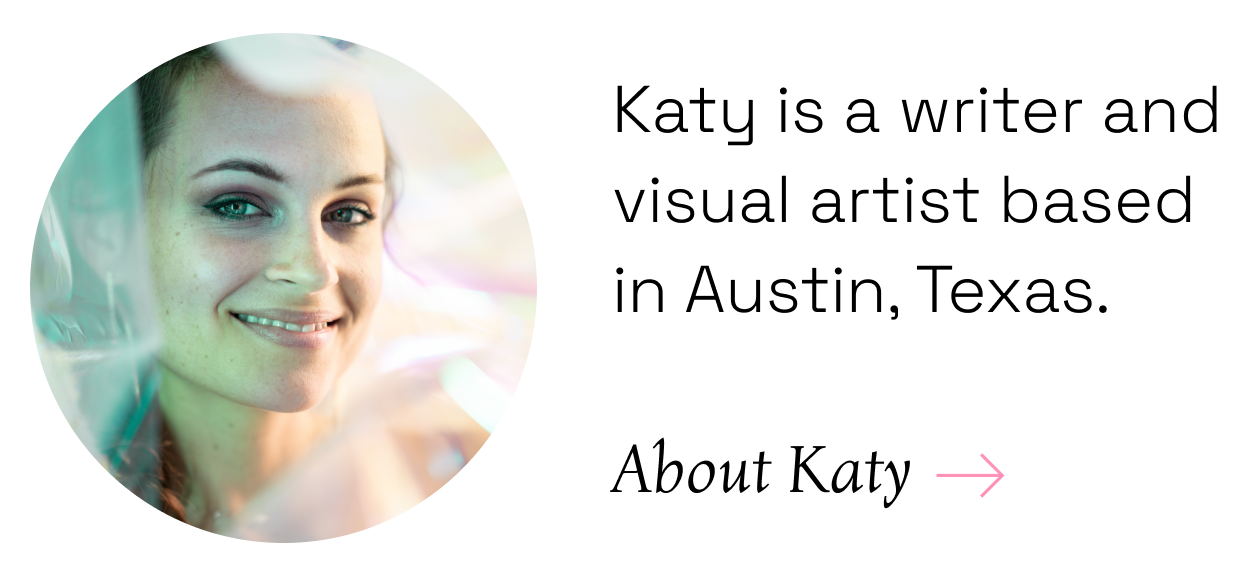One of my favorite hobbies in college was to go to a thrift store and pull a $50 haul of thrifted clothes to experiment with.
I’d come home, lay them all out, and start putting together outfits for imagined occasions like a life-sized Barbie doll.
As I tried things on and altered the pieces to my liking, I slowly discovered the shapes, cuts, and colors that looked best on me. Over time, I grew more and more bold with color.
When I invested in nice pieces that were brand new, I knew what styles would go with what I had, and what I’d reach for most often. I knew what fabrics and stitching signaled good quality, and exactly what shapes would flatter my figure.
I knew because I’d experimented.
I shared my dorm room with a math major who lovingly called these sessions “Katy’s dress up.” In the low-stakes environment of my room, I could test ideas freely, allowing my style to emerge out of play.
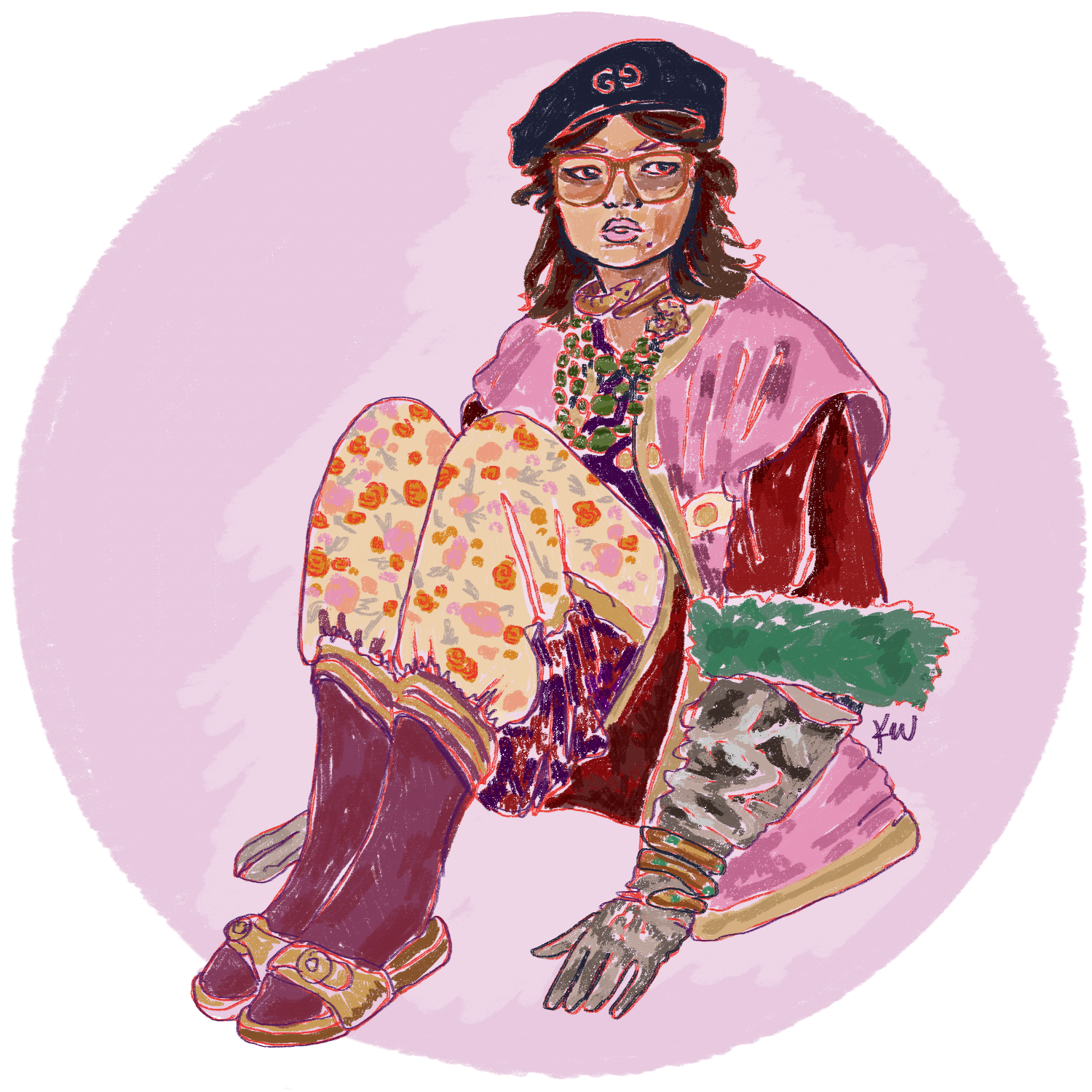
This method of discovering what I liked by playing with whatever was available became a guiding principle.
The “try/fail” paradigm is far too linear.
All of life can be a series of experiments and a sandbox of research, allowing clarity to come from unexpected places.
The Mindset of Experimentation
Not knowing how to do a thing is rarely what stops us from starting. It’s more often the fear of failing, or the fear of wasting time energy pursuing something indefinitely, never quite reaching the success we imagine.
This is why experimentation is so useful.
As long as it’s fun and interesting, you keep going.
You try lots of new things.
You do field research, talking to people who are also doing it, and listening for sparks of excitement.
The idea of an experiment has far less pressure, it doesn’t assume that you know what you’re doing. It suggests exploration, adventure, following clues, and building a way forward based on what works. The emphasis is on the journey, not the destination, making the entire process far more sustainable.
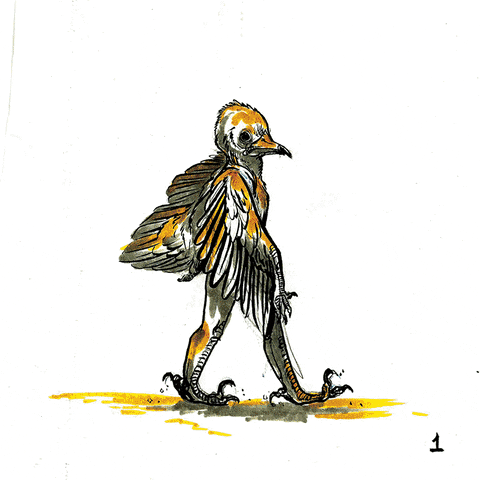
.This relief from perfectionism was so effective for me that I started experimenting with the way I do things as well as what things I do.
- I discovered that creating art pieces was far more fun for me with a deadline of a themed event to show each piece.
- I discovered that some of my favorite writing sessions happen in a group with others, or at a stylish cafe in an unnecessarily posh outfit.
- I discovered that reading mythology and going to dinner parties gives me far more material for content (and personal insights) than reading non-fiction.
- And, I discovered that removing any fear or shame from my belief systems and motivations has made me a far more effective and happy person overall.
All of the parts of living that bury us in self-criticism ease up when each action is an experiment.
And, the repetitious and mundane parts become personalized and interesting when we run experiments and iterate them over time.
Our default becomes self-discovery instead of convention, and though we have more responsibility for our experience, we also release the burden of an ill-fitting, unexamined life.
✵ ✵ ✵
The fear that my skills couldn’t represent the visitations of the Muses stopped me for far too long.
In Greek mythology, the nine Muses are the goddesses of of the creative and intellectual arts. Back then, they didn’t take personal credit for their work in the same way we do: authorship of great works was attributed to one of the Muses visiting.
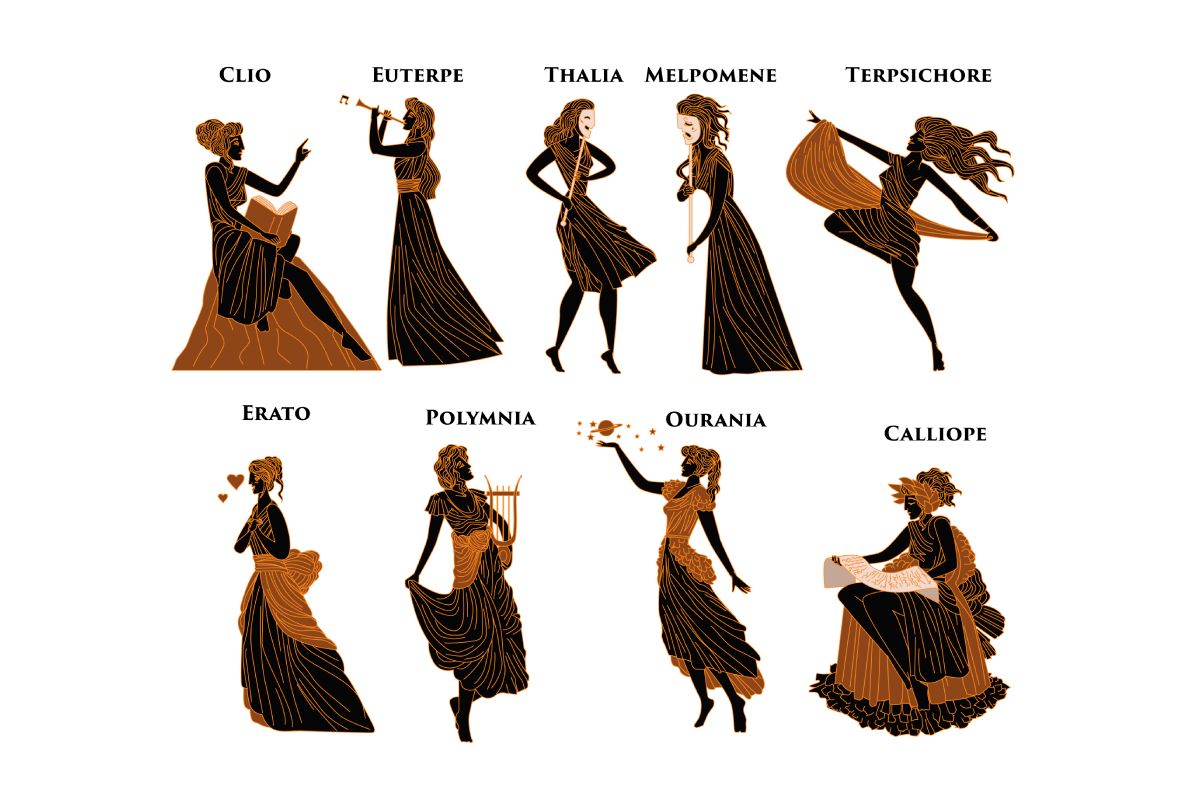
This meant that the ego of creativity and intellect went away. A philosopher or musician was considered more of a steward or a conduit rather than the author of their creations.
The act of creating became a responsibility to the ideas themselves, rather than a report of their worthiness.
The goal, then, was to be ready for the Muses when they visited, and to respond immediately.
Inevitably, the Muses visit us before we have the skills to honor the great ideas they present.
…Which can be frustrating and confounding.
We want to play the notes we hear in our minds, or craft the words we feel in our hearts, or paint the images we visualize. Then, our skills fail to to the ideas justice, and instead of trying again and again, we stop.
I’ve skipped so many art ideas because of analysis paralysis.
What if I haven’t developed my skills and style enough to represent the image in my mind?
What if I make something I don’t like?
The times I’ve come to a canvas thinking it’s a throwaway piece, or just a fun exercise of practice with color, I swear that’s when I make my best work.
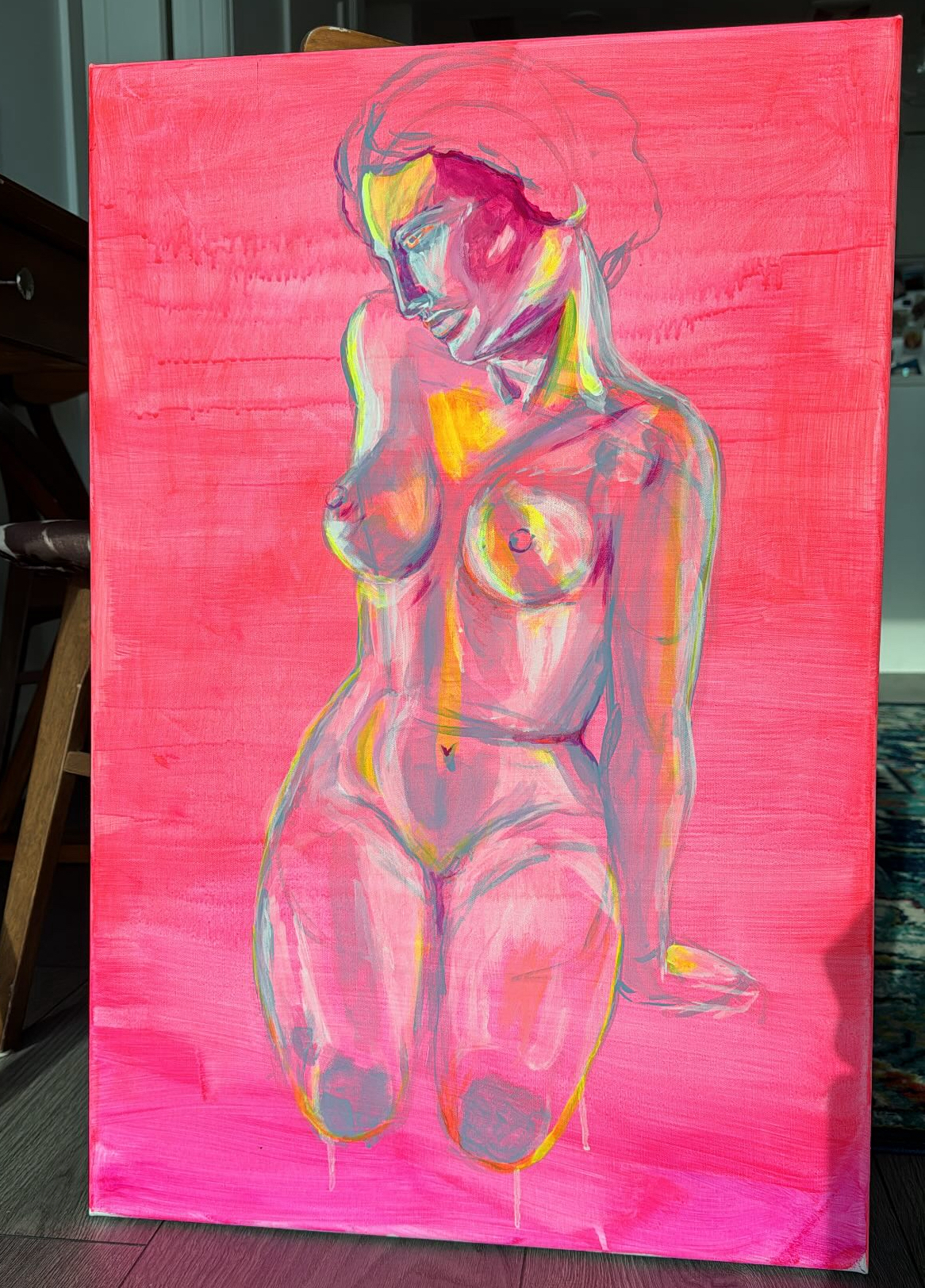
This piece happened at a paint party, while I sat in a group of people on a dark porch and painted by my phone flashlight. I was talking and eating between brushstrokes, and I expected to sketch a piece I’d finish later.
The more I’ve looked at this piece, the more I love it. She emerged from the colors while I was hardly paying attention. My analytical mind was fooled into distraction by the casual atmosphere.
It made me think that my skills aren’t the thing in the way at all, or, that the idea in my mind is just the carrot to get me to practice them with abandon.
Which begs the question…
What if the Muses visited to romance us into practicing each skill?
Perhaps they could care less if their ideas are modeled perfectly onto the canvas. What if the journey of learning to honor them with our skills were the carrot for the ultimate creation, which is our very selves?
The Muse of music visits you with an idea for a song, hardly caring if you ever produce it to perfection. She wants to lure you to practice making music, to feel the pleasure of hitting the right note at the right time, and to enjoy the inspiration motivating your craft.
As you pine to produce the masterwork, you evolve as a masterpiece of a person.
Experiment with every area of life, every desire, and every vision, then, to see what shape YOU become over time, and watch with awe as your whole life takes on the colors of your inner world.
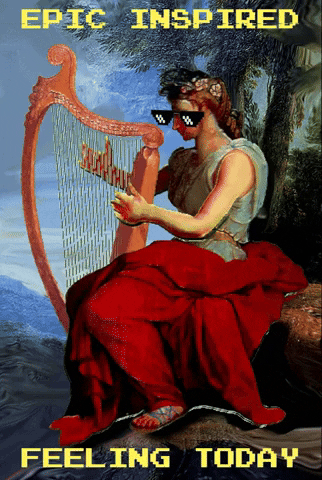
Let goals become an experiment towards your desires, and let the experiments fill your time with engaging research.
You know what you’ll get when you do what you’ve done in the past. What will happen when you do what you haven’t done? Run an experiment.
The results of each experiment are rarely a yes/no failure.
Usually, they provide more information. They show you how you feel, what you think, what works and doesn’t work, and the best ways to adapt and evolve.
We look far more foolish saying we want a thing and fixating on failure than we do testing new methods and iterating as we go.
Build castles in the sky…
This quote from Henry David Thoreau captures the feeling of experimentation so beautifully that I read it four times over when I first found it:
“I learned this, at least, by my experiment: that if one advances confidently in the direction of his dreams, and endeavors to live the life which he has imagined, he will meet with a success unexpected in common hours.
He will put some things behind, will pass an invisible boundary; new, universal, and more liberal laws will begin to establish themselves around and within him; or the old laws be expanded, and interpreted in his favor in a more liberal sense, and he will live with the license of a higher order of beings.
In proportion as he simplifies his life, the laws of the universe will appear less complex, and solitude will not be solitude, nor poverty poverty, nor weakness weakness.
If you have built castles in the air, your work need not be lost; that is where they should be. Now put the foundations under them.”
– Henry David Thoreau

